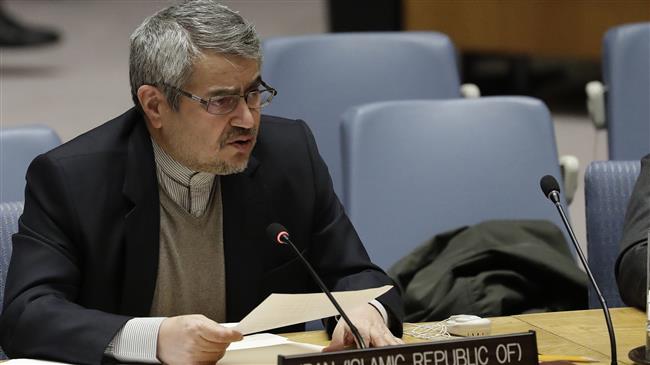
RNA - Gholamali Khoshrou said on Wednesday that the three-year Saudi war on Yemen has no legitimacy, adding that the bombardment campaign against the Arab state has achieved nothing but massacre, hunger, diseases and the destruction of its infrastructure.
He made the remarks in response to a letter submitted by his Saudi counterpart, Abdullah al-Muallami, to the Security Council demanding that Iran be held accountable for allegedly supplying Yemen’s Houthi fighters with ballistic missiles.
Khoshrou went on to say, “It is not the first time Saudi Arabia enters into correspondence against Iran in order to cover up its defeats in Yemen, and the international community is well aware of this fact.”
“With adventurism and inexperience, the Saudis have helped inflict cholera on millions of Yemeni people and targeted children and civilians in the course of their bombardments,” he said.
The senior Iranian official added that the Saudi regime should “abandon adventurism and warmongering and engage in constructive political dialog with Yemen, which is its neighbor, while respecting the people’s rights.”
Iran basically believes in no other solution than a political one to the conflict in Yemen, he said.
The Islamic Republic, he said, wants Saudi Arabia to immediately join a peace process in Yemen and stop actions that have failed to bring peace to Yemen, but rather helped develop al-Qaeda and Daesh terror groups there.
Khoshrou also expressed dismay at the sale of US weapons to Saudi Arabia, calling on the Muslin world and the international community to pressure Saudi Arabia to stop killings in Yemen.
On Monday, the Saudi-led coalition, which is engaged in a bloody military campaign against Yemen, displayed wreckage of what it claimed to be fragments of ballistic missiles supplied to the Houthis by Iran.
Iran rejected the groundless claims, with its Islamic Revolution Guards Corps (IRGC) saying the accusations are aimed at diverting attention from Riyadh’s war crimes in Yemen.
Blackmailing UN again?
The Saudi letter to the UN coincided with Saudi Crown Prince Mohammed bin Salman’s meeting with UN Secretary General Antonio Guterres in New York.
During the meeting, bin Salman presented a $930-million check to the UN chief for “efforts to ease” the humanitarian crisis of the kingdom's own making in Yemen.
The money was from both Saudi Arabia and the United Arab Emirates, which is Riyadh’s main ally in the destructive war on Yemen.
During the meeting, Guterres, who once described the Saudi war as “stupid,” stressed that the Yemen crisis requires a political solution, and not just a humanitarian response.
He also expressed the UN’s readiness to work to find a solution that will “end the suffering in Yemen.”
Saudi Arabia, which has been blamed for most civilian casualties in Yemen, is infamous for what human rights groups call “blackmailing” the UN to keep silent on its atrocities in Yemen.
In 2016, Saudi Arabia’s name appeared in a blacklist of child killers, but then-UN chief Ban Ki-moon removed it from the list shortly afterwards.
Details of the Saudi lobbying campaign were revealed by Reuters and diplomats said the UN chief was subjected to “bullying, threats, and pressure” and “real blackmail.”
Saudi Arabia and its allies launched the war on Yemen in March 2015. The military campaign has killed and injured over 600,000 civilians, according to the latest figures released by the Yemeni Ministry of Human Rights.
Several Western countries, the US and the UK in particular, are accused of being complicit in the Saudi-led aggression on Yemen as they supply the Riyadh regime with advanced weapons and military equipment.
847/940